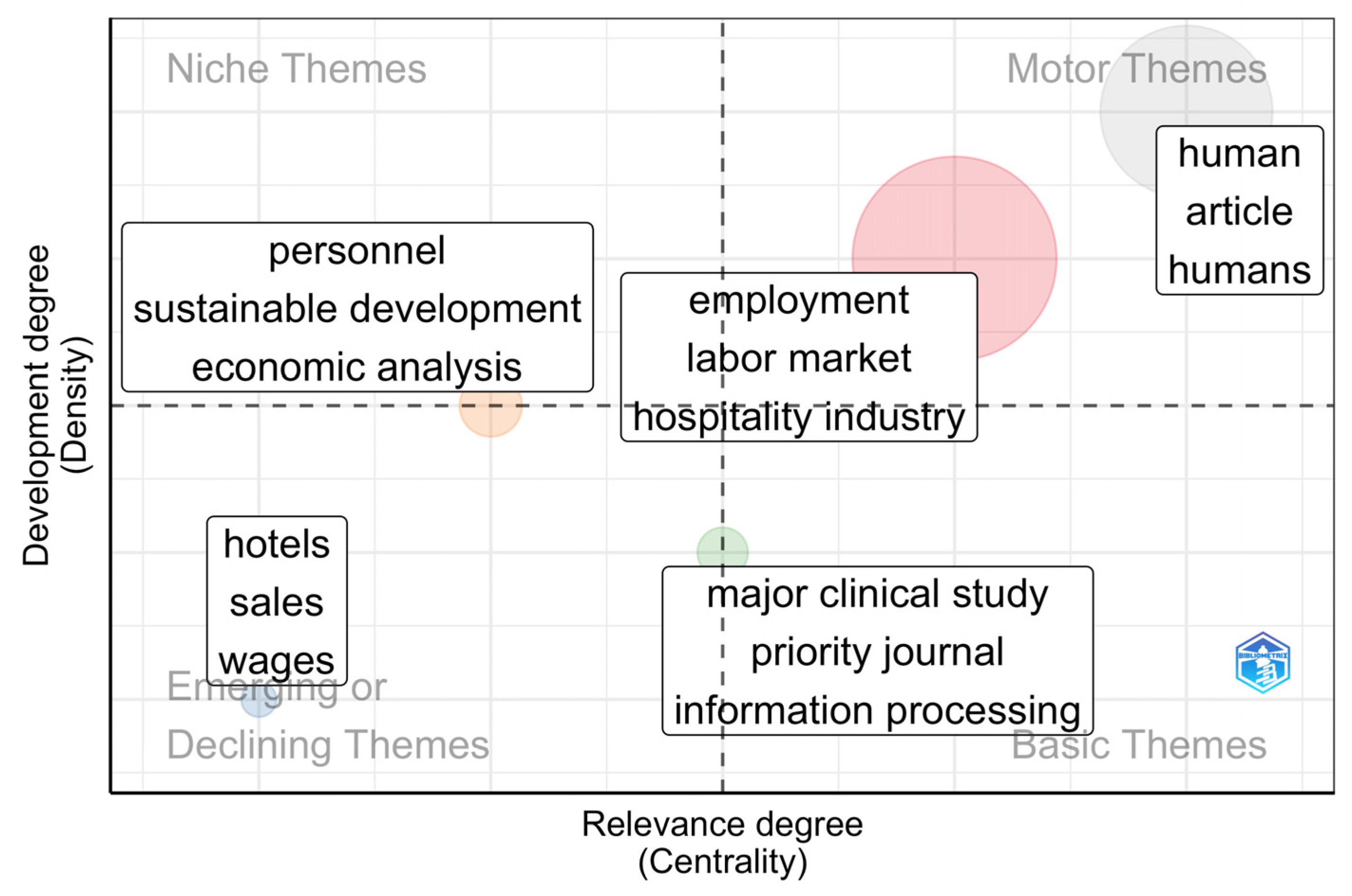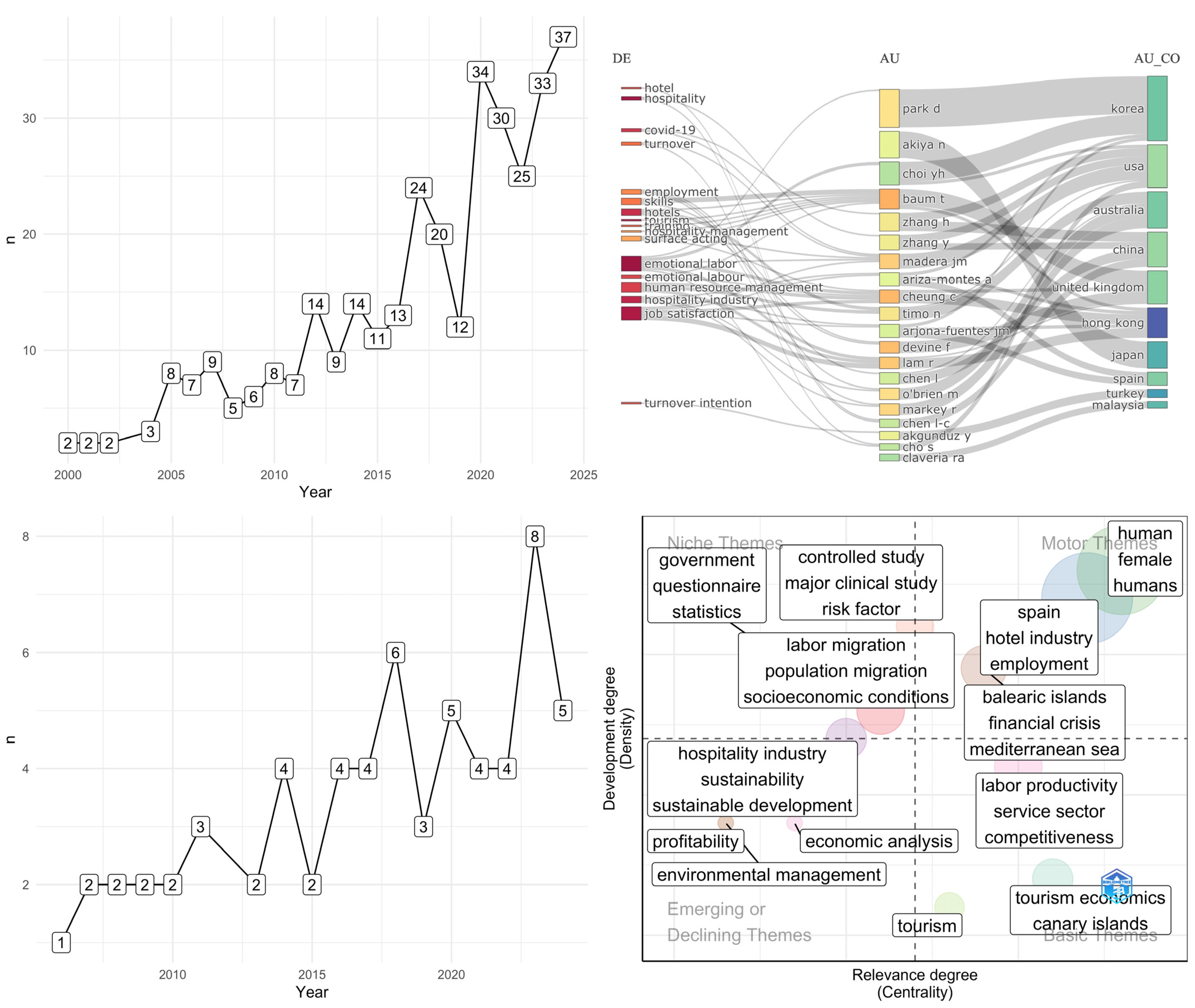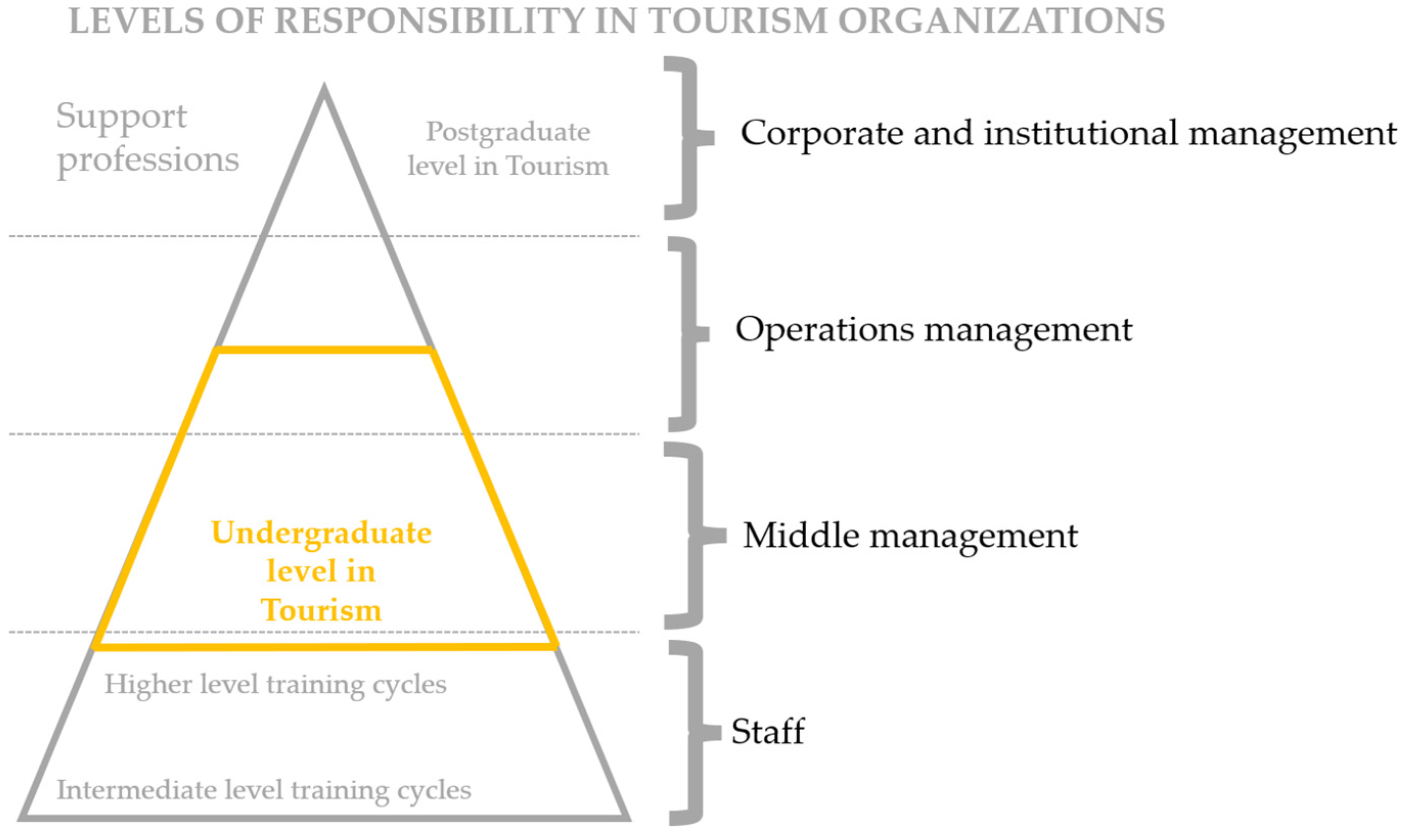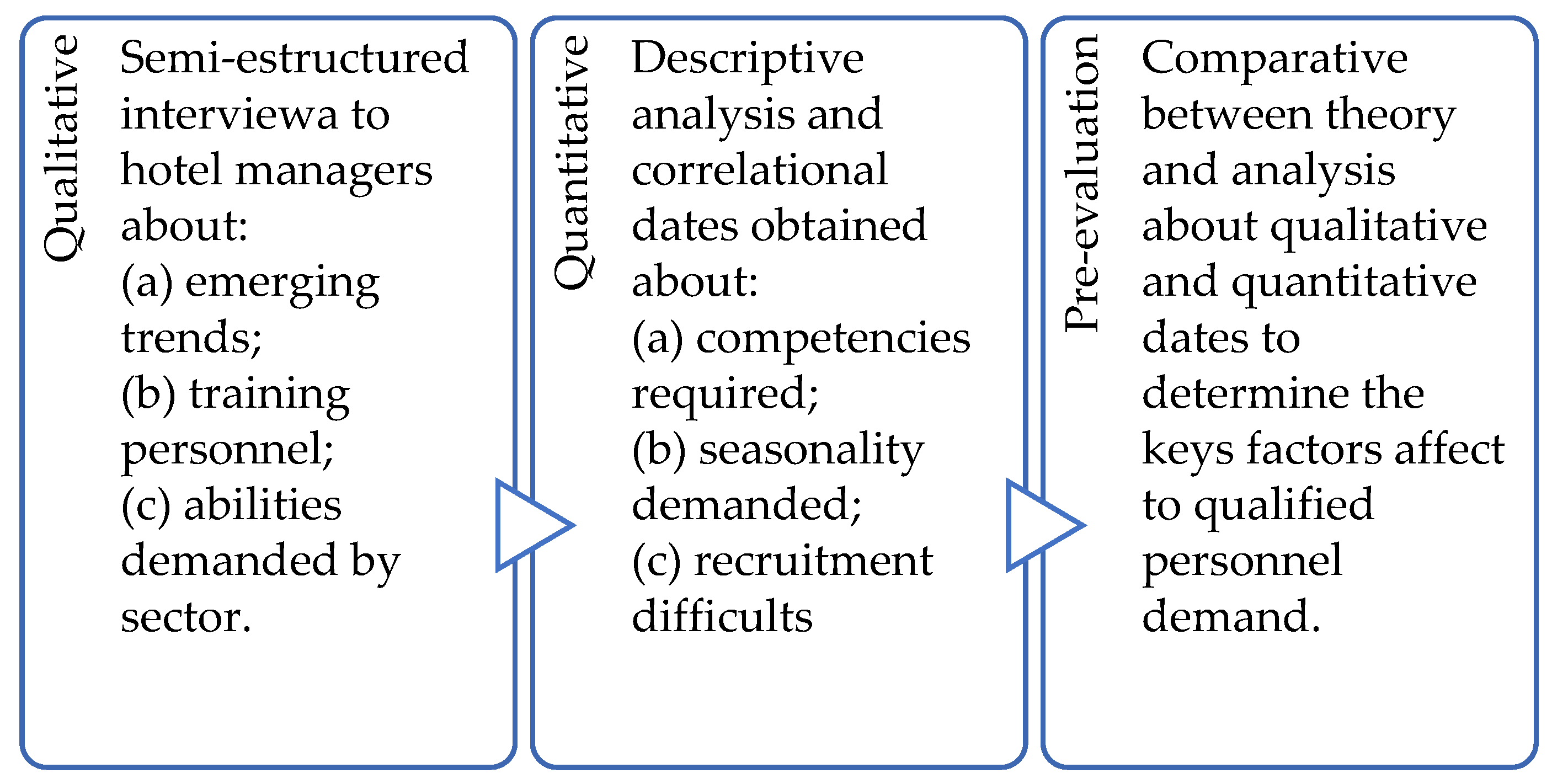Theoretical Framework and Preliminary Evaluation of a Model for Analysing the Qualified Personnel Needing’s in the Hotel Accommodation Sector
Abstract
1. Introduction
- RQ1: Is the research on human resource competencies in the hotel industry appropriate to the needs of the sector?
- RQ2: Are the competencies of the Degree in Tourism studies aligned with the needs of the hotel industry?
- RQ3: Do the human resources departments in the hotel industry look for qualified personnel in the labour market with specialized training to fill their vacancies?
2. Bibliometric Analysis
3. Theoretical Framework
3.1. Competence Development
3.2. Adaptation to Labour Market
3.3. Application
4. Results & Discussion
5. Conclusions
Author Contributions
Funding
Institutional Review Board Statement
Informed Consent Statement
Data Availability Statement
Conflicts of Interest
References
- Abdollahi, A., Ghaderi, Z., Beal, L., & Cooper, C. (2023). The intersection between knowledge management and organizational learning in tourism and hospitality: A bibliometric analysis. Journal of Hospitality and Tourism Management, 55, 11–28. [Google Scholar] [CrossRef]
- Aldaz Hernández, S. M., Guerrero Vaca, D. M., Cejas Martínez, M. F., & Pacheco Sanunga, H. G. (2023). Job skills in the tourism sector: A model of vocational training. Universidad Ciencia Y Tecnología, 27(119), 41–51. [Google Scholar] [CrossRef]
- Archer, B. (1995). The impact of international tourism on the economy of Bermuda. Journal of Travel Research, 34(2), 27–30. [Google Scholar] [CrossRef]
- Aria, M., & Cuccurullo, C. (2017). Bibliometrix: An R-tool for comprehensive science mapping analysis. Journal of Informetrics, 11(4), 959–975. [Google Scholar] [CrossRef]
- Baum, T. (2019). Hospitality employment 2033: A backcasting perspective (invited paper for ‘luminaries’ special issue of international journal of hospitality management). International Journal of Hospitality Management, 76, 45–52. [Google Scholar] [CrossRef]
- Baum, T., Mooney, S. K., Robinson, R. N., & Solnet, D. (2020). COVID-19’s impact on the hospitality workforce—New crisis or amplification of the norm? International Journal of Contemporary Hospitality Management, 32(9), 2813–2829. [Google Scholar] [CrossRef]
- Beesley, L. G., & Davidson, M. C. (2013). A critical analysis of skilled labour supply and demand in the Australian hospitality industry. Journal of Quality Assurance in Hospitality & Tourism, 14(3), 264–280. [Google Scholar]
- Blanco, E., Rey Maqueira, J., & Lozano, J. (2009). Economic incentives for tourism firms to undertake voluntary environmental management. Tourism Management, 30(1), 112–122. [Google Scholar] [CrossRef]
- Bogan, E., & Dedeoglu, B. B. (2020). Hotel employees’ corporate responsibility perception and organizational citizenship behavior: Perceived external prestige and pride in organization as serial mediators. Corporate Social Responsibility and Environmental Management, 27(5), 2342–2353. [Google Scholar] [CrossRef]
- Brien, A., Thomas, N. J., & Brown, E. A. (2017). How to hotel employee job-identity impacts the hotel industry the uncomfortable truth. Journal Hospitality Tourism Management, 31, 235–243. [Google Scholar] [CrossRef]
- Brownell, J., & Chung, B. G. (2001). The management development program: A competency-based model for preparing hospitality leaders. Journal of Management Education, 25(2), 124–145. [Google Scholar] [CrossRef]
- Caballero, J., Constantin, M., Holguin, A., & Köpke, S. (2022). How Spanish hospitality companies can overcome the staff-shortage challenge. Mckinsey & Company. Available online: https://www.mckinsey.com/industries/travel-logistics-and-infrastructure/our-insights/how-spanish-hospitality-companies-can-overcome-the-staff-shortage-challenge (accessed on 4 October 2024).
- Caixabank. (2024). Caixabank Dualiza. Memoria de actividades corporativas Año 2023. Available online: https://www.caixabankdualiza.es/wp-content/uploads/2024/03/memoria-de-actividades-2023.pdf (accessed on 6 December 2024).
- Carnevale, A., Smith, N., & Strohl, J. (2013). Recovery: Projections of jobs and education requirements through 2020. Georgetown University Center on Education and the Workforce. Available online: https://cew.georgetown.edu/cew-reports/recovery-job-growth-and-education-requirements-through-2020/ (accessed on 4 October 2024).
- Castro García, Y., & Hernández Silva, V. (2024). Dirección del capital humano y la estrategia de la organización: En el sector servicios turísticos. Revista Criterio Libre, 22(40), 84–93. [Google Scholar] [CrossRef]
- CBRE. (2024). Análisis y proyecciones del sector hotelero español. Available online: https://www.cbre.es/insights/viewpoints/analisis-y-proyecciones-del-sector-hotelero-espanol (accessed on 25 October 2024).
- Ceballos Hernández, C., Arias Martín, C., Ruiz Jiménez, A., Sanz Domínguez, C., & Vázquez Bermúdez, I. (2010). La formación en turismo en España: Pasado, presente y futuro en el nuevo espacio europeo de educación superior. Cuadernos de Turismo, 25, 45–67. Available online: https://revistas.um.es/turismo/article/download/109571/104161/ (accessed on 15 October 2024).
- CEDEFOP. (2024). Spain: Upskilling and reskilling in the tourism industry. Available online: https://www.cedefop.europa.eu/en/news/spain-upskilling-and-reskilling-tourism-industry (accessed on 3 November 2024).
- Cheung, F., Tang, C. S., Lim, M. S. M., & Koh, J. M. (2018). Workaholism on job burnout: A comparison between American and Chinese employees. Frontiers in Psychology, 9, 2546. [Google Scholar] [CrossRef]
- Chung-Herrera, B. G., Enz, C. A., & Lankau, M. J. (2003). Grooming future hospitality leaders: A competencies model. Cornell Hotel and Restaurant Administration Quarterly, 44(3), 17–25. [Google Scholar] [CrossRef]
- Deci, E. L., & Ryan, R. M. (2000). The What and why of goal pursuits: Human needs and the self-determination of behaviour. Psychological Inquiry, 11(4), 227–268. [Google Scholar] [CrossRef]
- Dopson, L., & Nelson, A. (2003). Future of hotel education: Required program content areas for graduates of U.S. hospitality programs beyond year 2000—Part II. Journal of Hospitality & Tourism Education, 15(3), 11–17. [Google Scholar]
- Fernández, J. A. S., Martínez, J. M. G., & Martín, J. M. M. (2022). An análisis of the competitiveness of the tourism industry in a context of economic recovery following the Covid-19 pandemic. Technological forecasting and Social Change, 174, 121301. [Google Scholar] [CrossRef]
- Fernández Solís, C., González Ramírez, R., & Gascó Gascó, J. (2024). Analítica de recursos humanos: Una revisión sistemática de literatura. Innova Research Journal, 9(3), 137–166. [Google Scholar] [CrossRef]
- Fotiadis, A., Polyzos, S., & Huan, T. C. T. (2021). The good, the bad and the ugly on COVID-19 tourism recovery. Annals of Tourism Research, 87, 103117. [Google Scholar] [CrossRef]
- Giousmpasoglou, C., & Marinakou, E. (2024). Human resources management in hotels. In The contemporary hotel industry: A people management perspective (pp. 129–158). Springer International Publishing. [Google Scholar]
- Goh, E., & Baum, T. (2021). Job perceptions of generation Z hotel employees towards working in COVID-19 quarantine hotels: The role of meaningful work. International Journal of Contemporary Hospitality Management, 33(5), 1649–1710. [Google Scholar] [CrossRef]
- Guillermo y Gloria. (2024). La flexibilidad: Competencia clave en los equipos de trabajo. Available online: https://guillermoygloria.com/clima-laboral/la-flexibilidad-competencia-clave-en-los-equipos-de-trabajo/ (accessed on 3 November 2024).
- Gutiérrez Broncano, S., & Rubio Andrés, M. (2009). El factor humano en los sistemas de gestión de calidad del servicio: Un cambio de cultura en las empresas turísticas. Cuadernos de Turismo, 23, 129–147. Available online: https://revistas.um.es/turismo/article/view/70071/67541 (accessed on 1 November 2024).
- Han, H., Kiatkawsin, K., Kim, W., & Lee, S. (2017). Investigating customer loyalty formation for wellness spa: Individualism vs. collectivism. International Journal of Hospitality Management, 67, 11–23. [Google Scholar] [CrossRef]
- Hofstede, G. (2001). Culture’s recent consequences: Using dimension scores in theory and research. International Journal Cross-Cultural Management, 1(1), 11–17. [Google Scholar] [CrossRef]
- Hosstim. (2024). Abordando la crisis de talento en la hotelería: Estrategias y soluciones. Available online: https://hosstinn.com/es/crisis-talento-hoteleria-formacion-hosstinn/ (accessed on 3 November 2024).
- Hsu, L. (2020). Learning tourism and hospitality subjects with MOOCs: A cross-sectional and longitudinal study. Journal of Tourism and Hospitality Education, 45(2), 99–114. [Google Scholar]
- Hu, Q., Schaufeli, W., Taris, T. W., Hessen, D. J., Hakanen, J., Salanova, V., & Shimazu, A. (2014). East is East and West is West and never the twain shall meet, Work engagement and workaholism across the Eastern and Western cultures. Journal of Behavioral and Social Sciences, 1, 6–24. [Google Scholar]
- ICCA. (2024). Country & city rankings 2023. Public abstract. International Congress and Convention Association. [Google Scholar]
- INE. (2024). Cuenta Satélite del Turismo en España, 2023. Available online: https://ine.es/dyngs/INEbase/es/operacion.htm?c=Estadistica_C&cid=1254736169169&menu=ultiDatos&idp=1254735576863 (accessed on 1 November 2024).
- Instituto de Turismo de España. (2024). Turespaña. In Encuesta de satisfacción de los turistas internacionales. Año 2023. Subdirección General de Conocimiento y Estudios Turísticos. [Google Scholar]
- Jafari, J. (1986). On domestic Tourism. Annals of Tourism Research, 13(3), 491–496. [Google Scholar] [CrossRef]
- Jeyacheya, J., & Hampton, M. P. (2020). Wishful thinking or wise policy? Theorising tourism led inclusive growth: Supply chains and host communities. World Development, 131, 104960. [Google Scholar] [CrossRef]
- Jiménez, A. (2009). Reflexiones sobre la necesidad de acercamiento entre universidad y mercado laboral. Revista Iberoamericana de Educación, 50, 1–25. [Google Scholar] [CrossRef]
- Kotollaku, M., & Lekli, L. (2024). English language, an interactive communication tool among tourism sector employees and foreign tourists. British Journal of Multidisciplinary and Advanced Studies, 5(3), 79–89. [Google Scholar] [CrossRef]
- Kotsakov, V., Marinov, V., Assenova, M., & Minkovski, R. (2024). Dimensions of employability in the hospitality industry at destination level—The case of a spa destination in Bulgaria. Journal of the Bulgarian Geographical Society, 50, 1–19. [Google Scholar] [CrossRef]
- Kraemer, T., Gouthier, M. H., & Heidenreich, S. (2017). Proud to stay or too proud to stay? How pride in personal performance develops and how it affects turnover intentions. Journal of Service Research, 20(2), 152–170. [Google Scholar] [CrossRef]
- Kuok, R. U. K., Koo, T. T., & Lim, C. (2022). Economic policy uncertainty and international tourism demand: A global vector autoregressive approach. Journal of Travel Research, 62(3), 004728752110725. [Google Scholar] [CrossRef]
- León-Gómez, A., Gimeno-Arias, F., García-Revilla, M. R., & Mora Forero, J. A. (2024). Evaluación Integral de la Solidez Financiera en el Sector Hotelero Español: Un Enfoque Estructural y Comparativo. INNOVA Research Journal, 9(1), 107–130. [Google Scholar] [CrossRef]
- Les Hoteliers. (2024). Segmentación de la demanda: Identifica al cliente más rentable. Available online: https://www.leshoteliers.com/segmentacion-demanda-hotelera/ (accessed on 2 November 2024).
- Liasidou, S., Afxentiou, G., Malkawi, E., & Antoniades, G. (2024). Attesting to hotel employees’ professionalism: Views and perceptions of managers. EuroMed Journal of Business, 19(4), 720–735. [Google Scholar] [CrossRef]
- Maher, A. (2004). Learning outcomes in higher education: Implications for curriculum design and student learning. Journal of Hospitality, Leisure, Sport, & Tourism Education, 3(2), 46–54. [Google Scholar]
- Mayo, C. R., & Thomas-Haysbert, C. (2005). Essential competencies needed by hospitality and tourism management graduates as determined by industry professionals and hospitality educators. The Consortium Journal of Hospitality and Tourism, 9(2), 5–17. [Google Scholar]
- Meng, F. (2010). Individualism/collectivism and group travel behaviour: A cross-cultural perspective. International Journal Cultural Tourism Hospitality Research, 4(4), 340–351. [Google Scholar]
- Mews. (2024). La importancia del análisis de datos en hoteles. Available online: https://www.mews.com/es/blog/importancia-analisis-datos-hotel (accessed on 30 October 2024).
- Mooney, S. K. (2020). Gender research in hospitality and tourism management: Time to change the guard. International Journal of Contemporary Hospitality Management, 32(5), 1861–1879. [Google Scholar] [CrossRef]
- Morakabati, Y., Beavis, J., & Fletcher, J. (2014). Planning for a Qatar without oil: Tourism and economic diversification, a battle of perceptions. Tourism Planning and Development, 11(4), 415–434. [Google Scholar] [CrossRef]
- Murakami, E. (2022). Immediate impacts of the COVID-19 pandemic on household economic activities and food security in Tajikistan. Economic Disasters Climate Change, 6, 259–291. [Google Scholar] [CrossRef] [PubMed]
- OECD. (2024). Tourism trends and policies 2024. Available online: https://www.oecd.org/content/dam/oecd/en/publications/reports/2024/07/oecd-tourism-trends-and-policies-2024_17ff33a3/80885d8b-en.pdf (accessed on 1 November 2024).
- Ozdemir, O. (2020). Board diversity and firm performance in the U. S. tourism sector: The effect of institutional ownership. International Journal of Hospitality Management, 91, 102693. [Google Scholar] [CrossRef]
- Pan, S. Y., & Yeh, Y. J. (2019). The crossover effect of work-family conflict among hotel employees. International Journal of Contemporary Hospitality Management, 31(2), 812–829. [Google Scholar] [CrossRef]
- Park, J., & Min, H. K. (2020). Turnover intention in the hospitality industry: A meta-analysis. International Journal Hospitality Management, 90, 102599. [Google Scholar] [CrossRef]
- Park, S. A., Kim, H. B., & Lee, K. W. (2017). Perceptions of determinants of job selection in the hospitality and tourism industry: The case of Korean university students. Journal Human Resources Hospitality Tourism, 16(4), 422–444. [Google Scholar] [CrossRef]
- Pérez Zúñiga, R., Mercado Lozano, P., Martínez García, M., Mena Hernández, E., & Partida Ibarra, J. A. (2018). La sociedad del conocimiento y la sociedad de la información como la piedra angular en la innovación tecnológica educativa. RIDE, Revista Iberoamericana para la Investigación y el Desarrollo Educativo, 8(16), 847–870. [Google Scholar] [CrossRef]
- Quinn, K. A. (2013). The importance of resource and interpersonal skills in the hospitality industry. Journal of Foodservice Business Research, 16(5), 439–447. [Google Scholar] [CrossRef]
- Raza, A., Farrukh, M., Iqbal, M. K., Farhan, M., & Wu, Y. (2021). Corporate social responsibility and employees’ voluntary pro-environmental behaviour: The role of organizational pride and employee engagement. Corporate Social Responsibility Environmental Management, 28(3), 1104–1116. [Google Scholar] [CrossRef]
- Reina-Mena, M., & Fusté-Forné, F. (2023). Guerra por el talento: Retos para los recursos humanos del sector hotelero. Dirección y Organización, 81, 69–81. [Google Scholar] [CrossRef]
- Rivas García, R. M., Cardoso Espinosa, E. O., & Cortés Ruiz, J. A. (2019). Propuesta de las competencias profesionales en turismo desde el enfoque del empleador. RIDE. Revista Iberoamericana para la Investigación y el Desarrollo Educativo, 9(18), 195–214. [Google Scholar] [CrossRef]
- Sainaghi, R. (2005). From contents to processes: Versus a dynamic destination management model (DDMM). Tourism Management, 27(5), 1053–1063. [Google Scholar] [CrossRef]
- Schmidt, J. A., & Pohler, D. M. (2018). Making stronger causal inferences: Accounting for selection bias in associations between high performance work systems, leadership, and employee and customer satisfaction. Journal of Applied Psychology, 103(9), 1001–1018. [Google Scholar] [CrossRef]
- SEPE. (2023). Año europeo de las competencias 2023. Available online: https://aeuropeocompetencias2023.sepe.es/Home-Anio-Europeo/detalleNoticia.html?folder=/2023/Agosto/&detail=Conoce-las-necesidades-formativas-de-las-ocupaciones-segun-el-grupo-de-familia-profesional (accessed on 18 October 2024).
- Sidhu, P., & Calderon, V. (2014). Many business leaders doubt U.S. colleges prepare students. Nation. Available online: https://news.gallup.com/poll/167630/business-leaders-doubt-colleges-prepare-students.aspx (accessed on 8 November 2024).
- Singh, A., & Hassan, S. C. (2024). Identifying the Skill Gap in the Workplace and Their Challenges in Hospitality and Tourism Organisations. Contemporary Challenges in Social Science Management: Skills Gaps and Shortages in the Labour Market, 112, 101–114. [Google Scholar]
- Singh, V., & Singh, A. (2024). Revolutionizing the hospitality industry: How chatGPT empowers future hoteliers. In Leveraging chatGPT and artificial intelligence for effective customer engagement (pp. 192–203). IGI Global. [Google Scholar]
- Sisson, L., & Adams, A. (2013). Essential hospitality management competencies: The importance of soft skills. Journal of Hospitality & Tourism Education, 25(1), 131–145. [Google Scholar]
- Smith, G., & Cooper, C. (2000). Competitive approaches to tourism and hospitality curriculum design. Journal of Travel Research, 39, 90–95. [Google Scholar] [CrossRef]
- Tesone, D. V., & Ricci, P. (2005). Job competency expectations for hospitality and tourism employees: Perceptions of educational preparation. Journal of Human Resources in Hospitality & Tourism Education, 4(2), 53–64. [Google Scholar]
- The American Hotel & Lodging Association. (2024). State of the hotel industry report. Available online: https://www.ahla.com/sites/default/files/AHLA.SOTI_.Report.2023.final_.002.pdf?inf_contact_key=b0761d7a09db3213fa8aa6ca34c764ff (accessed on 17 November 2024).
- Tisdell, C., & Wen, J. (1991). Foreign tourism as an element in PR China’s economic development strategy. Tourism Management, 12(1), 55–67. [Google Scholar] [CrossRef]
- Turiwork. (2024). Capital humano en turismo. Available online: https://turiwork.com/capital-humano-en-turismo/ (accessed on 7 November 2024).
- Velázquez-Castro, J. A., & Cruz-Coria, E. (2022). Gestión del talento e innovación en el sector hotelero. El caso de Pachuca, Hidalgo, México. Innovar, 32(83), 105–120. [Google Scholar] [CrossRef]
- Wan, Y. K. P., Wong, I. A., & Kong, W. H. (2014). Student career prospect and industry commitment; the roles of industry attitude, perceived social status and salary expectations. Tourism Management, 40, 1–14. [Google Scholar]
- Wang, Y., & Tsai, C. (2014). Employability of hospitality graduates: Student and industry perspectives. Journal of Hospitality & Tourism Education, 26(1), 125–135. [Google Scholar]
- Wood, R. C. (2024). Working in hotels and catering. Taylor & Francis. [Google Scholar] [CrossRef]
- Yeh, C. M., & Trejos, B. (2015). The influence of governance on tourism firm performance. Current Issues Tourism, 18(4), 299–314. [Google Scholar] [CrossRef]






| N | ||
|---|---|---|
| 1 | (Hospitality OR Hotel*) AND (Labour OR Labor) | 1965 |
| 2 | (Hospitality OR Hotel*) AND (Labour OR Labor) AND (Survey OR Questionnaire) | 335 |
| 3 | (Hospitality OR Hotel*) AND (Labour OR Labor) AND (Spain OR España) | 63 |
| 4 | (Hospitality OR Hotel*) AND (Labour OR Labor) AND (Survey OR Questionnaire) AND (Spain OR España) | 11 |
| Qualitative | Quantitative |
|---|---|
| Greater labour flexibility | High turnover |
| Better working conditions | Extended vacancies |
| Less extensive shifts | Need accentuated in important tourist destinations |
| Appropriate work-life balance | Increasing investment in digital and customer service skills training programs to improve staff readiness and retention in this sector |
| Investing in digitization to optimize recruitment or in continuing education programs | |
| Adapting labour policies to these new demands |
| Fields | Companies | Career Opportunities | CFGM | CFGS | Tourism Degree | Master Tourism |
|---|---|---|---|---|---|---|
| Accommodations | Hotel/Camping/Spa and in general any accommodation company (including accommodation matches for Cruises) | Director | X | |||
| Deputy director | X | |||||
| Lodging Area Manager | X | |||||
| Head of Reception | X | |||||
| 2nd Head of Reception | X | |||||
| Receptionist | X | T | ||||
| First Concierge | T | |||||
| Janitor | T | |||||
| Reception and/or Concierge Assistant | T | |||||
| Public Relations | X | T | ||||
| Book Manager | X | |||||
| Head of Administration | X | |||||
| Sales Manager | X | |||||
| Commercial | X | T | ||||
| Administrative | X | T | ||||
| Administrative Assistant | T | |||||
| Governor | C | X | ||||
| Section manager (Sub governor) | X | T | ||||
| Laundry and Linen Manager | X | T | ||||
| Camping Manager | X | T | ||||
| Tourist or Leisure Time Animator | X | T | ||||
| Hotel Chains and Associations | Hotel Chain manager | C s/t | ||||
| Chief Financial Officer | C s/t | X | ||||
| Human Resources Manager | C s/t | X | ||||
| Sales Manager | C s/t | X | ||||
| Marketing Manager | C s/t | X | ||||
| Quality Manager | C s/t | X | ||||
| Operations Manager | C s/t | X | ||||
| Reservations manager (booking) | C s/t | X |
| Authors and Year | Develop | Competencies |
|---|---|---|
| Smith and Cooper (2000) | Different studies that have advanced knowledge about the most appropriate competencies for the hotel sector. They created different models of competencies useful for developing the human resources system of a hotel company. |
|
| Brownell and Chung (2001) | ||
| Chung-Herrera et al. (2003) | ||
| Maher (2004) | ||
| Sisson and Adams (2013) | ||
| Wang and Tsai (2014) | ||
| Dopson and Nelson (2003) | They identify the most representative areas of work in hotels: human resources management, accounting, new technologies, marketing, public relations, sales and business management. | |
| Tesone and Ricci (2005) | Include new competencies |
|
| Mayo and Thomas-Haysbert (2010) | The figure of Revenue Manager emerges in hotels and requires other competencies of interest. |
|
| Quinn (2013) | He stated that most of the skills in the tourism industry are in areas of work directly related to personalized attention. |
|
| Wang and Tsai (2014) | Identified new competencies in human resources management |
|
| List of Competencies | France | USA | Spain |
|---|---|---|---|
| Capacity for analysis and synthesis | X | X | X |
| Organizational and planning skills | X | X | X |
| Oral and written communication in native language | X | X | X |
| Knowledge of foreign language | X | O | X |
| Computer skills related to the field of study | X | X | X |
| Information management capacity | X | X | X |
| Troubleshooting | X | O | X |
| Decision making | X | O | X |
| Teamwork | X | X | X |
| Working in an interdisciplinary team | X | O | X |
| Working in an international context | O | X | X |
| Interpersonal relationship skills | X | X | X |
| Recognition of diversity and multiculturalism | O | O | X |
| Critical reasoning | O | O | X |
| Ethical commitment | X | X | X |
| Autonomous learning | X | O | X |
| Adaptation to new situations | X | X | X |
| Creativity | O | O | X |
| Leadership | X | O | X |
| Knowledge of other cultures and customs | X | O | X |
| Initiative and entrepreneurship | O | X | X |
| Motivation for quality | X | X | X |
| Sensitivity to environmental issues | X | O | X |
Disclaimer/Publisher’s Note: The statements, opinions and data contained in all publications are solely those of the individual author(s) and contributor(s) and not of MDPI and/or the editor(s). MDPI and/or the editor(s) disclaim responsibility for any injury to people or property resulting from any ideas, methods, instructions or products referred to in the content. |
© 2025 by the authors. Licensee MDPI, Basel, Switzerland. This article is an open access article distributed under the terms and conditions of the Creative Commons Attribution (CC BY) license (https://creativecommons.org/licenses/by/4.0/).
Share and Cite
López, S.M.C.; Guerra, I.R.; Barreal, J. Theoretical Framework and Preliminary Evaluation of a Model for Analysing the Qualified Personnel Needing’s in the Hotel Accommodation Sector. Tour. Hosp. 2025, 6, 21. https://doi.org/10.3390/tourhosp6010021
López SMC, Guerra IR, Barreal J. Theoretical Framework and Preliminary Evaluation of a Model for Analysing the Qualified Personnel Needing’s in the Hotel Accommodation Sector. Tourism and Hospitality. 2025; 6(1):21. https://doi.org/10.3390/tourhosp6010021
Chicago/Turabian StyleLópez, Santos Manuel Cavero, Ignacio Ruiz Guerra, and Jesús Barreal. 2025. "Theoretical Framework and Preliminary Evaluation of a Model for Analysing the Qualified Personnel Needing’s in the Hotel Accommodation Sector" Tourism and Hospitality 6, no. 1: 21. https://doi.org/10.3390/tourhosp6010021
APA StyleLópez, S. M. C., Guerra, I. R., & Barreal, J. (2025). Theoretical Framework and Preliminary Evaluation of a Model for Analysing the Qualified Personnel Needing’s in the Hotel Accommodation Sector. Tourism and Hospitality, 6(1), 21. https://doi.org/10.3390/tourhosp6010021







